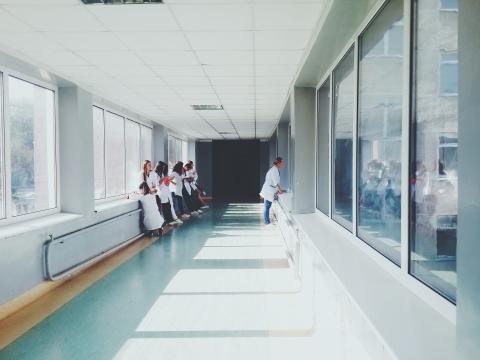
Flash Covid-19: Modelling of the hospital dissemination of COVID-19
Due to the impact of the Covid-19 epidemic on health, the French National Research Agency (ANR) has launched “Flash Covid-19” calling for scientific communities to mobilise to combat the disease. One of the projects to receive funding is project MOD-COV, led by Lulla Opatowski from the Centre for research into epidemiology and population health (CESP – Université Paris-Saclay, UVSQ, Inserm)
The goal of project MOD-COV is to model the hospital dissemination of Covid-19, to be able to implement adapted and optimised control measures. This project has been officially launched thanks to the expertise at the CESP, on the UFR Simone Veil campus, in modelling the transmission of infectious diseases, and more specifically, in the dissemination of antibiotic-resistant bacteria!
Modelling to better understand epidemics
The research group is specialised in the epidemiology of resistance to antibiotics, and more particularly, in the modelling of the transmission of infectious diseases and antibiotic-resistant bacteria in populations. One of the main topics of Lulla Opatowski’s work is modelling the potential interactions between anti-infective medication and the bacteria and viruses within the microbiota (all the living micro-organisms in our body) in individuals. The goal of modelling is to integrate all the factors that either increase or decrease the propagation of antibiotic-resistant bacteria. “This propagation is particularly problematic in hospitals and retirement homes. We have therefore developed models to study epidemics in health care settings”, explains Lulla Opatowski.
These are the models used in the launch of MOD-COV. The goal is to quickly adapt these models to Covid-19, to provide support to the hospitals, in the short term, and more generally to healthcare facilities who have to deal with epidemics such as this. The idea is to use a modelling approach to offer optimised control measures and to manage nosocomial (hospital-acquired) epidemics much more efficiently. By carrying out in silico (computer-based) experiments, modelling compares different scenarios and assesses which ones are capable of reducing the spread of such epidemics.
In the long term, the project will study the data collected during the Covid-19 outbreak, and assess the indirect effect this may have on other epidemics in the hospitals, for example those linked to antibiotic-resistant bacterial infections.
Consequences on modelling, beyond the current crisis
Epidemiological modelling isn’t rare, but viral outbreaks in hospitals and retirement homes have not been addressed as they should have been in the past, despite the real public health issue they present. “There have already been outbreaks of flu and gastroenteritis in retirement homes. But modelling has only very rarely been used to optimise the organisation of the service there and for the implementation of control measures.” Likewise, models used for nosocomial (hospital-acquired) antibiotic-resistant bacteria, do not always take into account the caregivers and the infections that can come about within these populations. In the case of the Covid-19 epidemic, these are real issues. “I think that project MOD-COV will provide real answers regarding hospital epidemics, and will bring decision support for the control and dissemination of the virus, as well as for other viruses over the long term”, concludes Lulla Opatowski.
